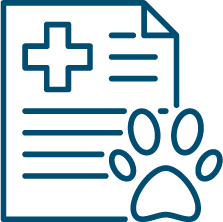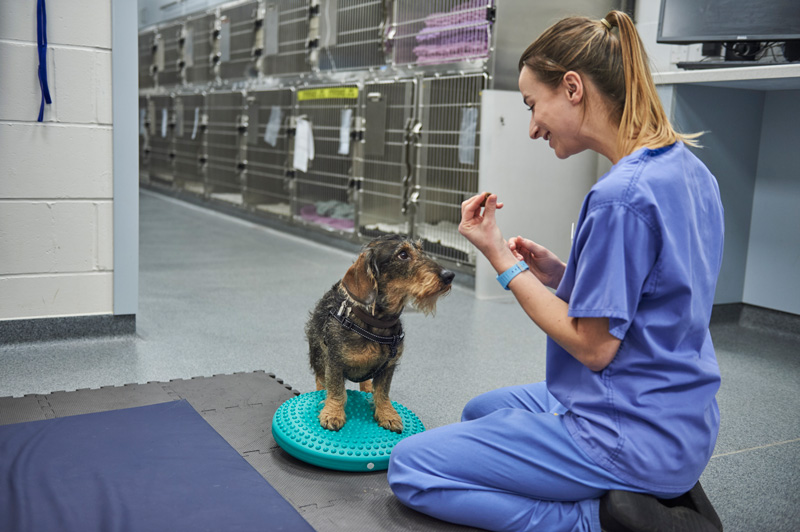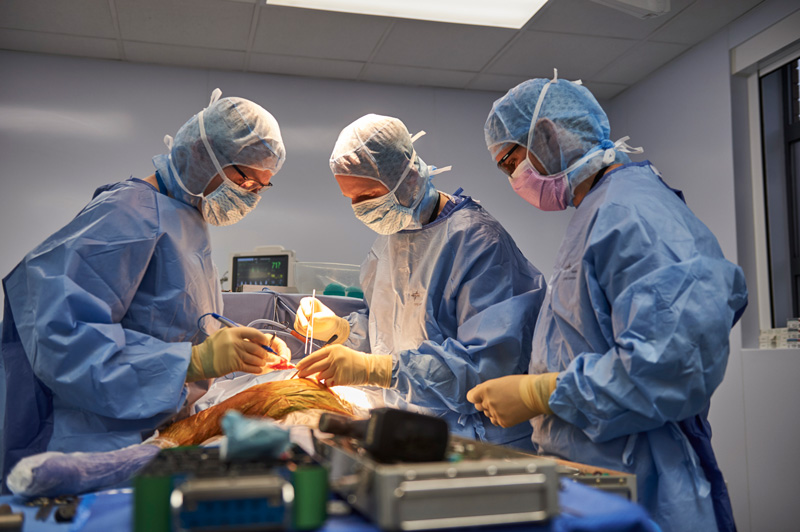×
CALL US TODAY
OUT OF HOURS EMERGENCY
0121 712 7071


Musculoskeletal disease is often first noticed when a pet develops a lameness. A detailed orthopaedic examination can enable the problem to be identified. However, musculoskeletal disease can be subtle, and the only sign that a pet has a problem may be a reluctance to run or jump. In these patients, it is also important for a very detailed Orthopaedic examination to be carried out. However, it may be necessary to carry out further tests such as scans, blood tests or keyhole surgery (arthroscopy) to reach a diagnosis.
At Willows, our aim is always to undertake the required tests as soon as possible, and this may mean that your pet will need to stay with us for a few days whilst these investigations are completed.

Physiotherapy is an essential part of recovery from musculoskeletal disease. Controlled movement is required to encourage these tissues to heal. An assessment by Willows Veterinary Physiotherapy team forms an integral part of many patient’s treatment plan.
Physiotherapy aims to stimulate the body’s natural healing process, reduce pain and restore mobility and function. Willows Veterinary Physiotherapist will provide a tailor-made treatment plan that will include recommendations for walking and exercises to be performed on your pet at home to support their recovery further.
Regular reassessment with Willows’ Veterinary Physiotherapist will be required to ensure the healing process is working effectively and allows adjustments to be made to the treatment plan, ensuring the fastest recovery.

For some patients, a surgical procedure will be required as part of the treatment process. Willows’ Specialist Orthopaedic team have over 80 years of combined experience underpinned with leading-edge technology, diagnostics and world-leading surgical techniques, providing the best in class Orthopaedic care.

Chronic musculoskeletal disease is a long-term injury or disease affecting muscle, ligaments, tendons or joints and pets of all ages can be affected. Examples include osteoarthritis (often referred to as arthritis) or long-term tendon pain (tendinitis). Most pets with such problems will have long-term lameness or reluctance to exercise. Initially, pets will regularly be given pain-relieving medication, which can reduce lameness. This may be effective in the short term; however, these medications may mask rather than cure the disease.
Chronic musculoskeletal disease can have a profound effect on your pet’s health. Pets can become depressed, aggressive or anxious when they are in pain. Cats will often go outside less and sleep more if they have sore joints. A dog may change the way they use their legs which can cause problems in other legs or the spine. It is quite common for lameness in a dog to be caused by a problem that has arisen secondary to a previously undiagnosed primary condition. By treating both the primary and secondary conditions, it can be possible to make a patient comfortable more quickly and maintain that state for longer than if treating the conditions separately.
Accurately identifying chronic musculoskeletal disease can present many challenges. A detailed Orthopaedic examination is required to assess all areas where a pet might be experiencing pain. Often an examination will require further tests, including scans, blood tests and joint fluid analysis, to understand the importance of each of these painful sites. Once all of the disease processes or injuries have been identified, an appropriate treatment plan can be created. This may involve medications, local injections, physiotherapy, pain relief, surgery, and a number of specific techniques to encourage healing.

Pets with chronic musculoskeletal disease may change due the way that the disease appears over time. They might become increasingly lame, lose muscle or become lame on a different limb. At Willows Performance and Rehabilitation Centre, our Specialist-led team believe that regular reassessment will help identify these changes earlier. Early detection is incredibly important and ensures that prompt intervention can prevent such changes from becoming more painful and make them easier to manage and quicker to respond to treatment.
A pets’ musculoskeletal system changes every single day from a growing puppy to an elderly cat. An animal’s muscles, bones and joints respond to the health and exercise of the body they are in. To maintain a healthy musculoskeletal system, it is important to exercise, feed and care for your pet in different ways for appropriate stages in their life. This may change if your pet becomes unwell or suffers an injury and making the right decisions early can lead to a faster and more complete recovery. Furthermore, it is possible to help prevent additional injury by making the right changes to their lifestyle.
Willows Performance and Rehabilitation Centre provides care and advice for your pet at every stage of their life. Our Specialist-led team also understand the challenges of owning a pet with musculoskeletal disease and are here to support you through your pet’s treatment.
Linnaeus Veterinary Group Trading as
Willows Veterinary Centre and Referral Service
Highlands Road
Shirley
Solihull
B90 4NH
Registered address:
Friars Gate,
1011 Stratford Road,
Solihull
B90 4BN
Registered in England Wales 10790375
VAT Reg 195 092 877
Monday to Friday
8am – 7pm
Saturday
8am – 4pm
Outside of these hours we are open 24/7 365 days a year as an emergency service.

Saturday
Morning 9am – 12pm
Afternoons 2pm – 4pm
Outside of these hours we are open 24/7 365 days a year as an emergency service.
